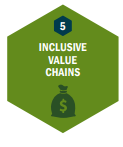Fostering more inclusive agrifood and forestry market chains, engaging the private sector where possible

Fostering more inclusive agrifood and forestry market chains, engaging the private sector where possible
Value chains have the power to transform livelihoods of some of the world’s poorest and most vulnerable people. Millions of people in the developing world work as smallholders—producers, labourers, traders, processors, retailers or consumers in agricultural value chains—yet they are the most disadvantaged in market systems. Unlocking the potential for people to participate equitably in markets and benefit from the opportunities provided by business is a proven way to create employment, improve business outcomes for smallholders and communities and increase economic security in developing countries.
ACIAR creates partnerships to increase the efficiency of supply chains, improve food safety and reduce food losses, and promote inclusive value chains that are profitable for everyone involved. We use best practices in agriculture production, supply-chain management and market-based solutions to build value through supply chains.
We work with business to create and strengthen complex agrifood value chains—from the farmers who produce goods to the markets where they are sold and the customers who buy them. We work with a range of partners and engage with the private sector to:
An ACIAR project in Pakistan has provided evidence for policymakers to drive much-needed reform to marketing of fresh produce. Despite being a major world horticultural producer, government regulation dictated that farmers could only sell produce at agricultural produce markets. There was considerable appetite for reform, and a growing understanding that this outmoded marketing model was holding Pakistan’s horticultural industry back. The project took a multipronged approach to provide empirical evidence to support policymakers. The federal government has been receptive, and in July the Prime Minister announced a PKR309 billion national agricultural ‘emergency’ program, including a PKR23.6 billion ($223 million) scheme to transform Punjab’s agricultural produce markets.
A project in Uganda is empowering smallholder dairy and honey farmers to control their own community development by unlocking the potential of agricultural supply chains. By coming together agricultural innovation platforms, farmers are using their collective knowledge and scale to develop their milk and honey products and access high-value markets. Additionally, capacity-building activities, including training, are helping farmers from the Mount Elgon region improve their management of bees and dairy cows to increase production of honey and milk.
The ‘Temperate fruits’ project has established a multiparty industry association in Vietnam that has been given the opportunity to manage industry planning, instead of government. Together with important temperate fruit actors, the project team studied examples of existing associations in Vietnam and Australia and explored different governance structures, business models and communication mechanisms for an industry association to function and deliver benefit to its stakeholders. This project has also resulted in the importation of licensed varieties from Australia to upgrade and diversify the retail offer and provide improved productivity and profits for growers.
Red meat consumption in South Africa has increased by about 20% since the early 1990s and is projected to increase by a further 20% by 2023. To meet this demand, an ACIAR-funded project has been improving the profitability of smallholder cattle farmers by developing cost-effective and environmentally sustainable value chains that supply cattle to meet the specifications of high-value, free-range beef markets. This outcome will improve the profitability and productivity of smallholder farmer businesses through higher prices for cattle and improved on-farm production systems that increase animal performance and supply of cattle.
CASE STUDY
Farmers in Myanmar are accessing a new path to market for their vegetables via an accreditation program to help them sell into high-value modern retail markets in the country’s largest city.
The supply of vegetables to distant urban markets is a major barrier for many smallholder farmers. City consumers demand a high level of food safety that often precludes many small operators, who opt instead to sell locally for less economic return.
Myanmar farmer U Sar Saw Myint and his wife traditionally sell their ripe tomatoes and capsicums in local markets around the fertile shores of Inle Lake (Nyaung Shwe). In May 2020, the couple teamed up with five farmers from Taung Boet Gyi village to pack 2,000 kg of ripe tomatoes into boxes and truck them 600 km to Yangon city, where they sold the produce for 34 cents/kg—triple the usual price at home.
The vegetables have been grown in accordance with Good Agricultural Practice (GAP) protocols, ensuring crops are grown and handled to safety standards and in a way that excludes foodborne diseases and pathogens.
The milestone is part of a wider effort across Myanmar and Vietnam to help farmers achieve the highest possible return for their produce. This is a major factor in further reducing poverty across the region.
The project’s leader, Dr Gordon Rogers, said farmers can gain even higher prices in the future due to their involvement in the project and the Myanmar GAP accreditation.
‘There is great potential for farmers to negotiate even higher prices because tomatoes delivered to the Yangon wholesale markets can reach $1.30/kg at this time of year,’ said Dr Rogers.
‘The farmers who produced the tomatoes are certified Myanmar GAP suppliers. This means they use the best agricultural practices to grow and handle their crops and test them to ensure they do not contain toxic pesticide residues and are safe to eat. In addition to tomatoes, the Taunbogyi village farmers are also producing sweet pepper, which is similar to capsicum, and two farmer groups in the neighbouring village of Pindaya already grow cabbage, cauliflowers, snow peas and other crops and are certified suppliers under the Myanmar GAP program.’